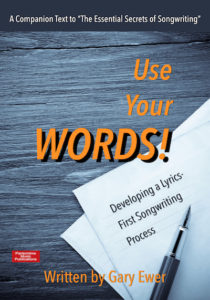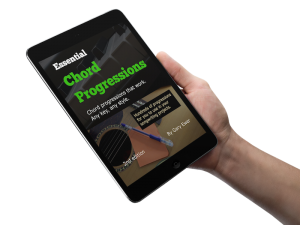The best composers of music will tell you that they have a routine — a kind of daily schedule and creative process — that they stick to religiously.
In practically all of the creative arts, a routine is seen to be beneficial. There are many reasons for this, but probably the best reason is this one: a routine makes it easier to set goals.
 “Use Your Words! Developing a Lyrics-First Songwriting Process” is FREE with your purchase of “The Essential Secrets of Songwriting 10-eBook Bundle. $37 USD. Immediate Download.
“Use Your Words! Developing a Lyrics-First Songwriting Process” is FREE with your purchase of “The Essential Secrets of Songwriting 10-eBook Bundle. $37 USD. Immediate Download.
Setting goals for yourself and then sticking to a writing routine means that it’s easier to know how close — or far away — you are from achieving those goals.
And since we’re all creatures of habit, a daily writing routine helps to train our musical brains to be creative when we’re ready to be creative. So if your normal routine is to have breakfast and then get going with your writing, your brain starts to feel comfortable with that expectation.
But even good songwriting routines can get stale after awhile, and then what do you do? A stale routine can be the start of writer’s block, and a moderate or severe block may cause us to simply stop.
If you’re finding right now that you seem stuck, where your normal writing routine isn’t lining up with your creative brain, it might be time to establish a new routine. That can be exciting, but how do you do it?
Here are 3 ideas for setting up a new songwriting routine that can make you productive and excited again:
- Be creative with a new writing time. If you’re usually a morning writer, switch to the evening and see how you feel about it. For many writers, drastically changing the time can act as a powerful shock to the system that has a chance of working. If your work or school schedule allows, try seeing if a midday writing session has merit.
- Start your writing time with instrumental playing. Whatever your instrument is, if you’ve been seeing it as something quite apart from your writing routine, it may create a powerful spark of imagination to pull the two worlds together. So try starting a writing session by taking out your instrument and playing for 5-to-10 minutes. You’d be surprised what something even as mundane as practicing scales can do to get your mind ready for creating music.
- Start your writing time with a short improvised “stream of consciousness” session. Sometimes changing your routine might mean making changes to the way you write, and improvisation is such an important activity in the creative arts. If you’ve been ignoring improvisation, it’s time to make it a normal part of your routine.
There are likely many other ways you can change things up, but the point is that now might be the best time to try to establish a new normal for yourself. You should be able to tell right away if the new routine is working.
And once you’ve established that it’s working, writing can feel like an entirely new experience, and you’ve got a fresh approach that will likely work for a few weeks or months.
 Written by Gary Ewer. Follow Gary on Twitter.
Written by Gary Ewer. Follow Gary on Twitter.
 Looking for lists of progressions you can use in your own songs? “The Essential Secrets of Songwriting” eBook Bundle has 2 main collections, plus eBooks on how to harmonize your own melodies, and more.
Looking for lists of progressions you can use in your own songs? “The Essential Secrets of Songwriting” eBook Bundle has 2 main collections, plus eBooks on how to harmonize your own melodies, and more.










